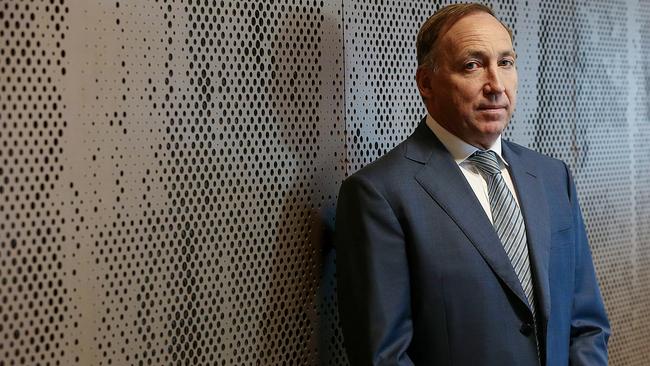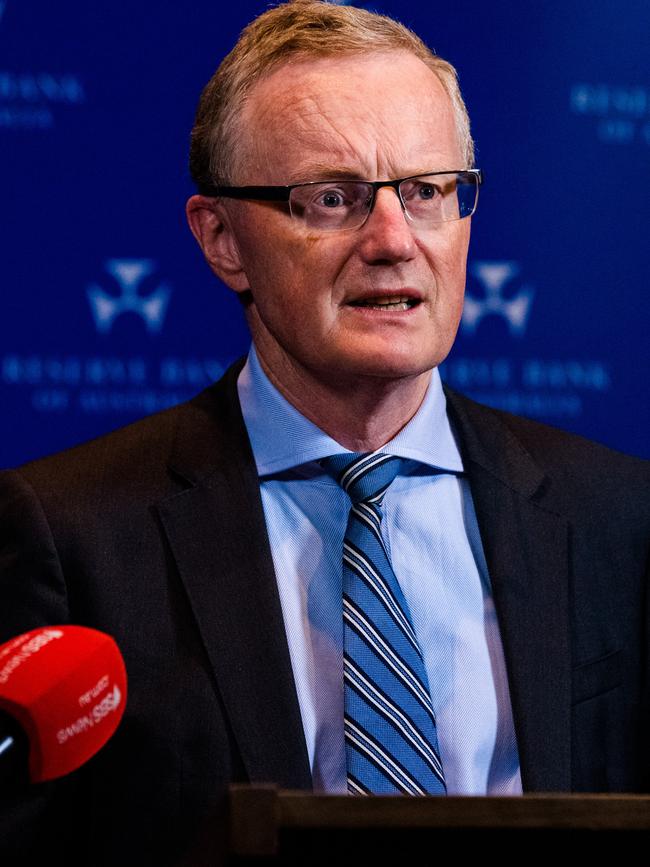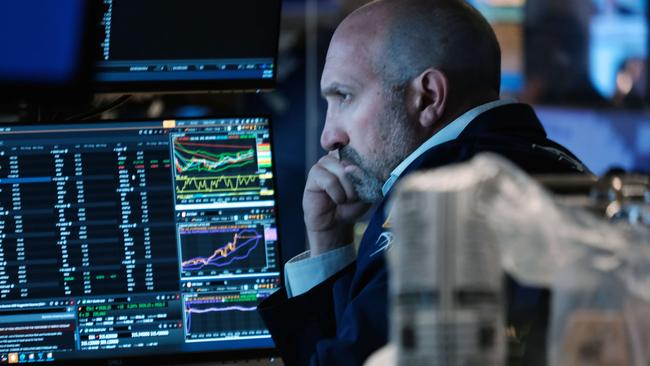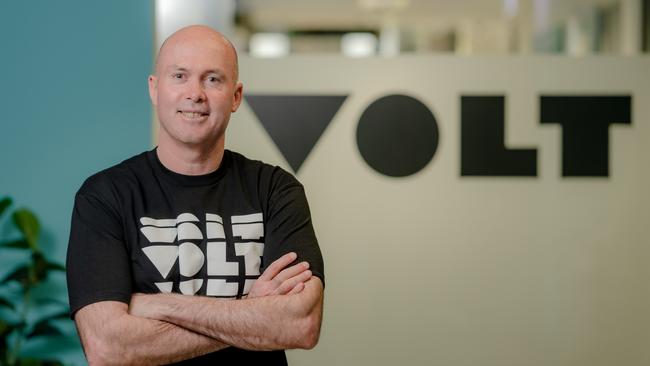AusSuper warns of more market pain to come, urges members to stay the course
It could be years before markets fully recover from the inflation wildfire.

Business
Don't miss out on the headlines from Business. Followed categories will be added to My News.
Mark Delaney of the $261bn AustralianSuper oversees the nation’s single biggest investment portfolio and has a sobering message about the turmoil playing out on global markets.
Expect as much as two more years of volatility.
The four-decade market veteran has seen all the cycles and while the cause of the last shock – Covid – is new, the way it is playing out is familiar.
Delaney was speaking to The Australian as the giant AusSuper told 2.3 million members it had posted its first negative annual return since the global financial crisis.

The 2.73 per cent reversal for AusSuper’s flagship balanced option for the year to end-June comes on the heels of an eye-watering 20.4 per cent surge a year earlier. The massive gulf in performance underscores the wild ride in global markets since last September as central banks scrambled to get on top of an inflation breakout.
The latest figures from AusSuper will set the tone for the entire super sector, with millions of Australians now bracing for negative or at best marginal returns, as a host of funds including UniSuper, REST, Hostplus and Cbus release investment updates in coming weeks.
A year of poor returns also sits uncomfortably with the hard won lift in the compulsory super rate to 10.5 per cent, which some workers suspect may be a trade off for a wage rise.
‘Not the end’
Delany says there are as much as two years of pain in store for markets which means the chief investment officer has kept AusSuper on a conservative investment footing.
“We don’t think this is necessarily the end of it, just because we’ve got to this period of June,” he says.
“These big adjustments tend to take a year or two to work through – they don’t just happen in isolation … it’s going to take quite a bit of time to get everything back into balance”.
Delaney had already been pulling back the risk settings in AusSuper’s massive portfolio but says it was the share speed of the inflation wildfire that took everyone by surprise, which in turn demanded an aggressive central banks response.

He recalls this time a year ago his counterparts at some of the world’s biggest pension funds were swapping notes about the market outlook. There many anticipated some inflation to take hold but none expected the numbers to be in the 8 per cent range for places such as the US or UK. In Australia headline inflation is currently running at 5.1 per cent.
How central banks go about containing this inflation will be a major test for the economy, Delaney says. He was speaking as the Reserve Bank of Australia on Tuesday is widely tipped to hike the cash rate target by another 50 basis points.
“The biggest issue will be the future path of inflation. And how much central banks have to do. If they have to do a lot. It’s going to be pretty troubling for the economy. If they can get away with not doing that much, then we might be able to skate our way through,” Delany says.
‘Stay the course’
Delaney likens the wild swings in the markets of the past three years to a bouncing ball. The journey into Covid was pretty rough on the way down, he says and is expected to be equally bumpy on the way out with high-priced technology stocks taking the brunt of it.
The phenomenal returns of the 2021 financial year was really a function of the excess money and massive stimulus that was taking place, he says.
“There was so much stimulus, through Covid and it fuelled a whole lot of things, and you saw technology and crypto were at the epicentre of it, and they’re all collapsing as free money is being withdrawn”.
“But the free money has also been a precondition for the creation of inflation because it’s fuelled all this excess expenditure. And in some ways, inflation is really a way that we’re paying it back. Everybody’s paying it back in terms of lower standard of living. But the central banks are going to respond to the inflation by slowing economies down or causing recessions.

For AusSuper, the portfolio loss came about from a weak share market performance, this was cushioned by “solid” returns from unlisted assets including infrastructure and property.
The biggest hits were from investments with exposure to technology and consumers, Delany says. Losses from Australian investments were more muted than international losses.
Despite the financial year loss, Delaney urged members to look at the longer and medium term returns. This includes 9.3 per cent over 10 years and 5.59 per cent through the three financial years that spanned Covid.
“The key message – and this is the case in every one of these downturns – is just to stay the course,” Delaney says.
“Volatility is part and parcel of building long term retirement savings. And there are going to be these episodes, but they’ll also be many years of really good returns. So members should stay the course. Note that the three year number is still five and a half per cent and its important to have a strategy which is designed to achieve the long run objectives”.
AusSuper’s negative 2.73 per cent return compares with the 10.2 per cent loss in Australian shares over the past financial year. Of course super fund performance is a result of a blend of many investments including local and international equities, property, infrastructure and bonds.
Unplugged
Volt, launched under rules designed to inject competition into the banking sector, was eventually undone by competition in the banking sector.
The neobank has spent $200m building a high-tech lending platform that no one needs. Commonwealth Bank last month launched its home grown instant lending business Unloan. Westpac is teaming up with 10x Banking and ANZ has its ANZ Plus business well underway. Elsewhere, National Australia Bank already bought a digital banking platform with 86 400 and Bank of Queensland on Monday showcased its digital banking transformation with tech firm Temenos.

Volt last week gave its 4000 customers just days to pull their money out and find another bank and will start closing accounts from Tuesday.
Volt hasn’t collapsed but it is returning its costly banking licence to bank regulator APRA which means it will no longer be able to take deposits.
“Please ensure you have withdrawn all your funds to leave a balance of $0 in all accounts before then,” it said in a note to customers last week.
With $108m in deposits, Volt stumbled after failing to get its lending settings right – that is the side of banking that pulls in the revenue. It had a lending book of a little over $80m suggesting it just couldn’t carve out a big enough customer base needed to pay for those deposits.
There has been a string of fund raisings through Covid after ultra-low interest rates crushed any prospect of lending with a meaningful profit margin.
After generating more than $80m in losses over two years Volt issued several warnings this time last year it needed more funds to continue building its banking platform. It also raised a red flag about continuing as a going concern without the fresh funds, this is where it brought in HSBC chair Graham Bradley to help with the process.
Rising interest rates over the past six months – the thing that it desperately needed – meant it was also the end of free investor money. In the months leading up to its banking exit Volt tapped investors for an additional $10m through two funding rounds but this wasn’t enough to keep it going.
johnstone@theaustralian.com.au
More Coverage
Originally published as AusSuper warns of more market pain to come, urges members to stay the course





